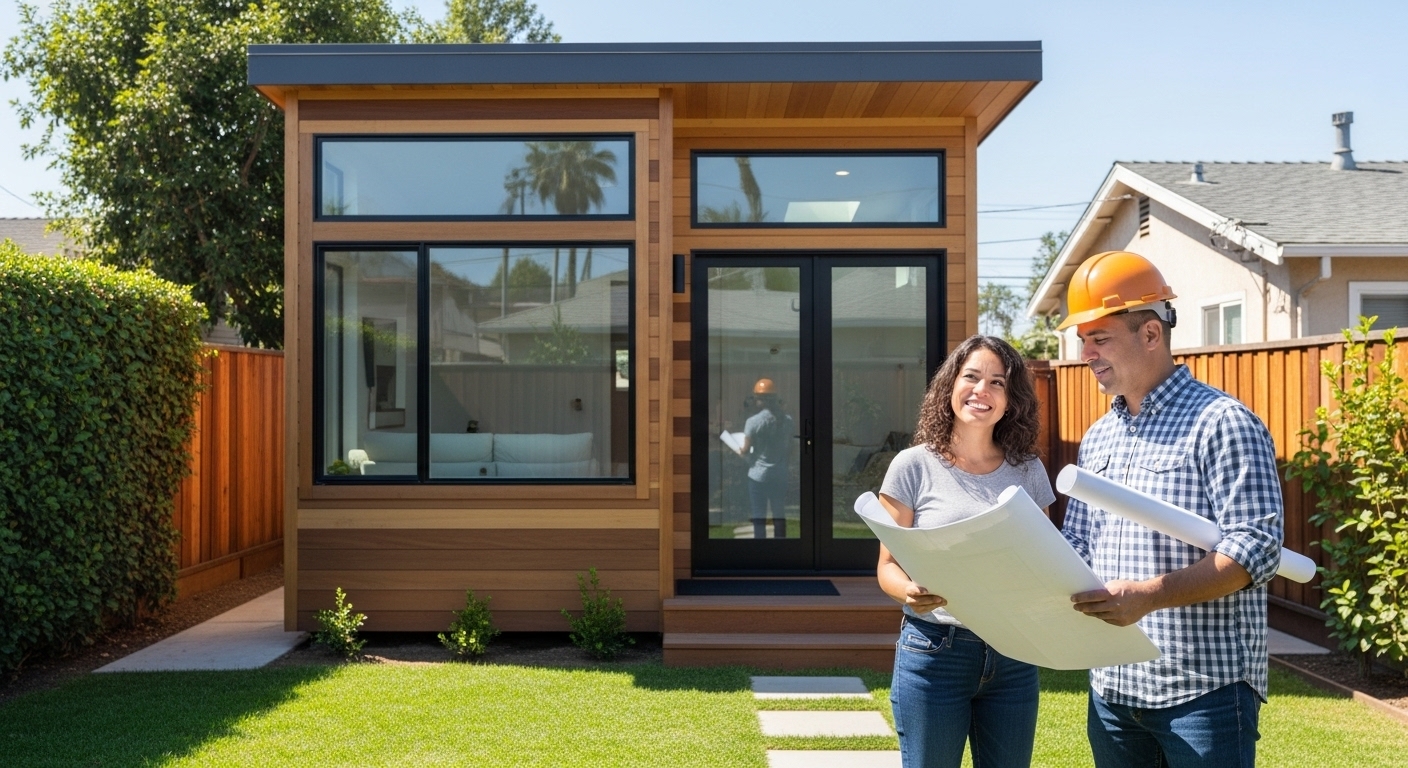Los Angeles is always busy with home building and remodeling. The city has nearly 17,000 general contractors listed with the Better Business Bureau. That makes choosing the best residential contractor in Los Angeles a challenging task for any homeowner.
You might be building a new house from the ground up or updating your existing home. Either way, you want a reliable contractor who does quality work. But how do you know which contractor is right for your project?
Asking smart questions is the best approach. This guide has 31 essential questions divided into clear groups. Each question includes an easy-to-follow explanation, showing you exactly why it matters for your project. Using these questions, you can easily identify a trusted contractor and make your home project successful without headaches.
Verify Licenses and Insurance
When choosing a residential contractor in Los Angeles, trust matters. Before you hire someone to build or renovate your home, confirm the contractor carries an active license and proper insurance coverage. These five essential questions help protect your home, family, and finances from legal and safety risks during construction.
1: Do you hold a valid California contractor license, and what is your license number?
California law requires residential contractors to have an active license for home projects costing over $500. Always get the license number and verify it on California’s Contractors State License Board (CSLB) website. A valid license proves the contractor meets all legal requirements and knows building standards.
2: Can you give me a copy of your Certificate of Insurance?
The Certificate of Insurance is official proof the contractor carries liability and workers compensation insurance. Liability insurance protects you if your property gets damaged. Workers compensation insurance covers worker injuries, keeping you safe from unexpected medical costs or lawsuits.
3: What coverage limits do your insurance policies have?
Insurance coverage limits show how much financial protection you have if problems arise during construction. Confirm the policy covers enough to rebuild your home or pay large medical bills. Low coverage limits can expose homeowners to unnecessary financial risk.
4: Does your insurance cover problems that happen after the project finishes ?
Completed operations coverage protects you after construction ends. If something the contractor did cause damage later, this insurance pays for repairs. Without it, future problems become your responsibility and cost you extra money.
5: Do you have a surety bond, and what type is it?
A surety bond gives you extra protection if the contractor fails to complete the job or violates California laws. Bonds act like a safety promise, ensuring you have financial backup. Ask about a performance bond or a license bond, which protects you if something goes wrong.
Ask About Experience and Past Projects
When hiring a residential contractor in Los Angeles, always check their experience first. You must confirm the contractor’s past work matches your project type. Asking these five questions helps you discover if the contractor has the skills, knowledge, and local expertise needed for your home building or renovation project.
6: How many years have you worked as a residential contractor, especially in Los Angeles?
Contractors with many years in business show reliability. Specifically, experience in Los Angeles means they understand local building codes and rules. This saves you from delays or fines during construction.
7: Have you completed projects like mine before?
You need a contractor who already knows how to handle your exact type of project. For example, someone who builds custom homes might not have enough experience remodeling kitchens or bathrooms. Matching their experience with your project reduces the chance of costly mistakes.
8: Can I view your portfolio and talk with your recent clients?
Looking at past projects shows you the contractor’s quality of work. Talking directly to previous clients helps you confirm if the contractor finishes on time, respects budgets, and communicates effectively. This gives you peace of mind before making a decision.
9: Do you have any special certifications or training in residential construction?
Contractors with extra training or certifications typically offer better quality. Certifications like green building or historical preservation indicate special knowledge and dedication. This shows your contractor goes beyond basic standards.
10: Do you understand the specific building codes and guidelines in my neighborhood?
Different Los Angeles neighborhoods have unique building rules. For instance, Pasadena has different regulations than Santa Monica or Beverly Hills. Hiring a contractor familiar with your neighborhood’s rules prevents issues with permits and inspections, saving time and money.
Project Management and Timeline
Managing your home project carefully matters as much as good building skills. Choosing a residential contractor in Los Angeles involves clearly knowing timelines, daily management, and communication methods. Asking these six clear questions helps ensure your contractor organizes your project professionally from beginning to end.
11: Who supervises and manages my project each day?
Knowing exactly who will oversee your project daily keeps everything smooth and organized. You deserve to clearly identify one responsible person for updates or questions. That way, issues get fixed fast, quality stays high, and you remain worry-free.
12: How soon can you start, and how long will my project take?
Time management affects your life and plans. A clearly stated start date and estimated completion timeline let you make accurate preparations, like temporary housing or storage needs. Asking upfront saves stress and surprises later on.
13: Will you handle all necessary permits and schedule required inspections?
Permits and inspections in Los Angeles can be complicated and time-consuming. When the contractor takes responsibility, your project follows local rules perfectly. It means fewer delays, no legal issues, and less paperwork for you.
14: Does your own crew do the actual work, or do you hire subcontractors?
Who performs the actual work impacts quality control. Some contractors manage trusted subcontractors, while others use their permanent crew. Knowing who works on your home helps maintain consistent quality and accountability every day.
15: If something unexpected happens, how do you manage changes or delays?
Construction rarely goes exactly as planned. Good contractors openly communicate unexpected issues and solve them professionally. Asking about their process now prevents frustration, extra costs, or longer delays if challenges arise.
16: How frequently will I receive updates, and what is your preferred communication method?
Regular, easy communication keeps you informed and comfortable during your home project. Clarifying how often the contractor updates you—daily, weekly, or at project milestones—lets you relax, knowing exactly how your project progresses.

Discuss Budget, Costs, and Contract Details
Budget discussions with your residential contractor in Los Angeles protect you financially. Asking direct questions about pricing, payments, and written agreements avoids misunderstandings. These five questions help homeowners stay financially safe and aware at every step of the construction project.
17: Is the price fixed or can it change, and what does it include exactly?
Fixed prices stay the same throughout the project. Estimates might increase later. You want an exact list of included items like materials, labor, and permits. This keeps costs under control with no unexpected expenses.
18: What payment schedule do you use, and how much upfront payment do you need?
California law sets strict limits on upfront payments. Understanding payment timing helps you control your budget easily. Payments tied to completed work stages keep your finances protected from contractor problems.
19: How do you manage unexpected extra costs or project changes?
Home projects sometimes uncover issues like plumbing or electrical problems. Contractors should explain extra costs immediately and wait for your approval. Good contractors handle unexpected events professionally to protect your budget.
20: Do you provide a detailed written contract covering every project detail?
Detailed contracts protect homeowners. Contracts must include price, materials, timelines, and project specifics. Written agreements stop disputes and guarantee everyone understands the work completely.
21: Do you charge extra fees beyond the original quote?
Some contractors add fees later for cleanup or disposal without telling homeowners upfront. Asking about extra fees from the start prevents surprise costs. You deserve full honesty about all possible charges before work begins.
Construction Quality and Warranty
Quality construction and dependable warranty protection help homeowners sleep comfortably at night. A residential contractor in Los Angeles should build homes to last and stand behind each project after completion. These seven questions give homeowners essential details about construction quality and warranty protection before hiring any contractor.
22: What specific warranties cover your construction work?
Homeowners need detailed warranty descriptions. Each warranty covers different items like materials or labor. Understanding these specifics keeps homeowners protected from unexpected expenses.
23: How many months or years does each warranty cover?
Longer warranties show stronger confidence in construction quality. Short warranties can cause homeowner concern. Exact warranty durations let homeowners know precisely the level of quality promised.
24: What exact steps do homeowners follow to file warranty claims?
Understanding warranty claim steps upfront avoids homeowner stress. Contractors must share procedures openly to guarantee straightforward claims. Knowing these steps makes warranty use easier later.
25: What items or circumstances remain uncovered under the warranty?
Some warranties limit protection under certain conditions. Asking specifically about exclusions identifies hidden limitations immediately. Homeowners stay fully informed and properly prepared for any uncovered situations.
26: Do warranties fully include subcontractor work?
Subcontractors often perform critical home project tasks. Confirming complete subcontractor warranty coverage avoids misunderstandings or financial risks later. Homeowners deserve to know precisely who remains responsible.
27: Do building materials also include separate manufacturer warranties?
Manufacturer warranties provide another layer of homeowner security. Knowing about extra product protection avoids unexpected costs. Homeowners gain double protection from product issues later.
28: Who exactly makes warranty repairs, and how do homeowners arrange repairs?
Identifying the exact repair team provides homeowners complete peace. Understanding the repair scheduling process avoids homeowner worries or struggles later. Clear answers about repairs create confidence in ongoing home care.
Communication and Customer Service
Open communication from your residential contractor in Los Angeles creates homeowner confidence. Asking contractors how they communicate prevents worries later. Homeowners benefit from dependable information sharing, smooth contact methods, and prompt responses. These five questions ensure homeowners stay informed and satisfied.
29: What methods of communication do contractors prefer with homeowners?
Contractors may prefer texts, phone calls, or emails for sharing information. Understanding preferred methods early avoids homeowner irritation and supports productive conversations.
30: What steps do contractors follow when homeowners raise concerns?
Homeowner issues need immediate attention. Contractors must explain how they respond when problems arise. Knowing the exact approach ensures homeowner comfort throughout construction.
31: After homeowners ask a question, how soon will contractors reply?
Contractors replying rapidly increases homeowner satisfaction. Quick responses demonstrate contractor respect, easing homeowner worries and maintaining project harmony.
Conclusion: Choosing Your Residential Contractor
Ask contractors all questions provided here. Check licenses carefully through the CSLB website. Call references and visit completed project sites personally if possible.
Notice how each contractor communicates. Select a contractor who answers honestly and patiently. Avoid contractors who dodge questions.
Lowest cost does sometimes mean lower quality. Choose contractors offering reasonable prices, strong experience, excellent communication, and proven reliability.
Los Angeles home construction involves strict rules. Use these questions to select a trustworthy residential contractor. Proper selection ensures smooth, successful home projects.






